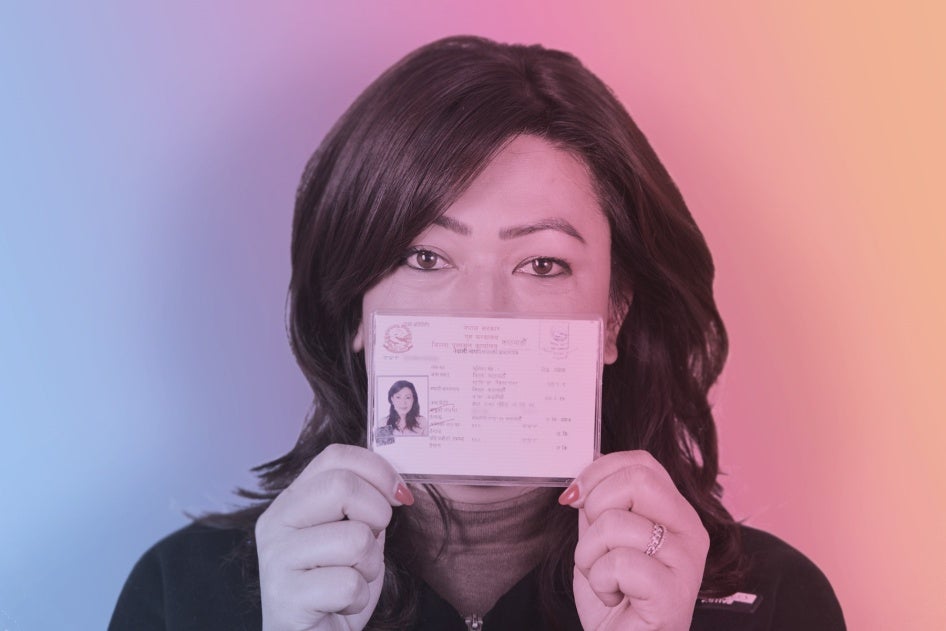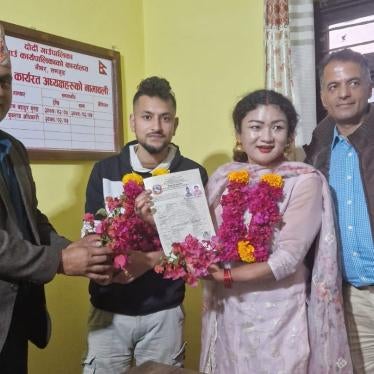(Kathmandu) – The government of Nepal should urgently create a clear, simple, and rights-respecting procedure that would allow transgender and third gender people to obtain official documents in accordance with their gender identity, Human Rights Watch said in a report released today. While Nepali policy allows in principle for transgender to people to obtain documents marked “other,” implementation is piecemeal and those who want “male” or “female” as their legal gender are forced to undergo invasive and unnecessary medical interventions and examinations.
The 67-page report, “‘We Have to Beg So Many People’: Human Rights Violations in Nepal’s Legal Gender Recognition Practices,” documents the significant policy gaps that remain in the implementation of Nepal’s legal recognition for transgender people, despite global recognition of Nepal’s progress. Nepal’s pioneering recognition of a third gender “other” category based on self-identification garnered widespread praise and made Nepal an important touchpoint for the rights of sexual and gender minorities. But Nepal has no explicit legal option to change a gender marker to “male” or “female,” and even the procedure for the third gender option is unclear and ad hoc. Interactions between transgender people and the state have become particularly fraught with discriminatory, ill-informed, and requirements for harmful medical practices.
“We began the fight for our dignity in 2001 and we secured a major victory at the Supreme Court in 2007, but the government has not yet implemented the order to recognize us based on our identities,” said Manisha Dhakal, executive director at the Blue Diamond Society, an LGBT rights organization. “Generations of transgender and third gender Nepalis have faced barriers and humiliation because of policy gaps, and we need real change now.”
In 2007, the first Supreme Court judgment on sexual orientation and gender identity ordered the government to take three steps: audit all laws and scrap those that discriminated on the basis of sexual orientation and gender identity; form a committee to study same-sex marriage policy options; and legally recognize a third gender category based on an individual’s own self-identification. The judgment in Pant et al. v. Nepal (2007) has been cited by courts around the world, including the Supreme Court of India, courts in the United States considering gender on passports, and the European Court of Human Rights, as a positive example. However, Nepali authorities continue to lag in carrying out the court’s order to recognize gender identity on the basis of self-identification.
Human Rights Watch found that some people – including people pursuing documents that list them as “third gender” or “other” – have been denied documents changing their gender or wrongly told they must undergo surgery to be eligible. A small number of people have been able to change their documents from “male” to “female,” but doing so invariably involves an invasive and humiliating physical exam in a medical setting, an experience that is rife with human rights violations.
“Trans women are women and trans men are men, and Nepal needs to match its reputation as a so-called beacon of hope for sexual and gender minorities with comprehensive policy change to respect our rights,” said Rukshana Kapali, chief executive officer at Queer Youth Group Nepal. “Nepal got a lot of credit for instituting the third gender option on citizenship certificates, but it is not implemented consistently, and it does not uphold the rights of people who identify as women and men.”
Human Rights Watch conducted the research for this report between August 2022 and December 2023. A researcher interviewed 18 transgender people and 1 intersex person who had attempted to change their legal gender or had not undertaken the process due to various barriers, as well as activists who help others undertake the legal gender recognition process, and government officials.
International human rights law and global medical standards of care support the complete separation of medical and legal processes with regard to gender transition. People seeking transition-related medical interventions should not face legal barriers, and people attempting to change their legal gender and name should not be required to undergo any medical procedures. The World Professional Association for Transgender Health, an international, multidisciplinary professional association, “opposes all medical requirements that act as barriers to those wishing to change legal sex or gender markers on documents.” The organization stated that “[m]edical and other barriers to gender recognition for transgender individuals may harm physical and mental health.”
The Yogyakarta Principles – drafted and signed in 2006 by a group of experts, including a former Nepal parliament member, Sunil Babu Pant – state that each person’s self-defined sexual orientation and gender identity is “integral to their personality” and is a basic aspect of identity, personal autonomy, dignity, and freedom. The principles are clear that gender recognition may involve, “if freely chosen, modification of bodily appearance or function by medical, surgical or other means.” Put simply, the process for legal recognition should be separate from any medical interventions. But if an individual’s personal transition process requires medical support, those services should be available and accessible.
Based on the Yogyakarta Principles, the Supreme Court in 2007 said that “self-feeling” is central to securing the rights of transgender people. Subsequent court decisions have further emphasized this principle. Nepal authorities should consistently apply this principle, and its application should not allow medical practitioners or bureaucrats to confirm or deny an applicant’s self-declared gender identity, Human Rights Watch said.
Nepal’s lack of a clear procedure for self-declaration of gender identity has led to decisions in individual cases based on government officials’ perceptions rather than the person’s “self-feeling.” Trans people who approach different administrative offices are given different advice and instructions, which sometimes contradicts what their peers are told for the same process elsewhere. One trans woman interviewed said: “The state just throwing in medical steps is a way they think they’re stabilizing something that was confusing, whereas we experience it as yet another barrier and yet another way in which we have to beg for our rights.”
“Forcing our community to undergo medical procedures that are expensive, unavailable, and in many cases unwanted by the individuals themselves, is a violation of our rights,” said Simran Sherchan, executive director at the Federation of Sexual and Gender Minorities-Nepal. “International consensus is that medical procedures for transitioning and legal procedures for transitioning need to be completely separated, and Nepal needs to make that clear.”







